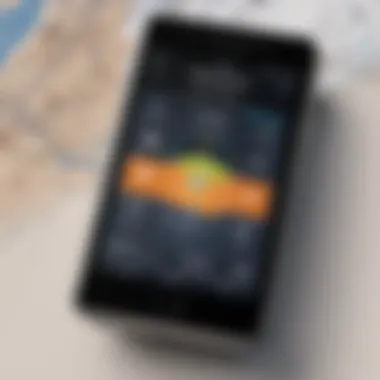Top GPS Devices for Efficient Multi-Stop Routing


Intro
In the world of logistics and travel, navigating through a maze of routes can often feel like trying to solve a Rubik's Cube blindfolded. For professionals who juggle multiple stops—whether for deliveries, service calls, or personal errands—the right GPS can truly make all the difference. A robust GPS system designed for managing several waypoints takes the hassle out of journey planning, optimizing routes not just for time, but also for fuel efficiency and convenience.
With endless options flooding the market, the challenge lies in discerning which GPS systems offer the best features for tackling complex itineraries. This guide will unpack the nitty-gritty details of the best GPS devices tailored for multiple route stops. From the essential functionalities to how they stack up in showcasing value for money, we'll help you navigate through the noise and land on the app that suits your unique needs.
Understanding Multiple Route Stops
Navigating through various destinations has become an integral aspect of daily life. Whether for personal errands or business operations, managing multiple route stops is crucial. This practice not only saves time but can also considerably reduce travel costs. In an age where quickness is often equated with efficiency, understanding how to effectively manage multiple stops can give an advantage, making the right GPS system all the more essential.
Definition and Importance
Multiple route stops refer to the ability to plan and execute a journey that incorporates numerous destinations along a single route. A good GPS does more than just point you in the right direction; it intelligently organizes your travel itinerary to optimize efficiency. The significance of this cannot be overstated. For instance, take a delivery driver who has to drop off packages at several different addresses across a city. Without a proper route planner, they may waste hours in traffic or, worse, miss deliveries entirely.
This technology helps ensure that users take the most time-efficient paths. Hence, not only do they arrive at their destinations quicker, but there's also the added benefit of reducing fuel consumption, leading to cost savings—a win-win situation.
Applications in Daily Life
The relevance of GPS systems with multiple route capabilities spans a broad spectrum. Here are some everyday applications:
- Delivery Services: In the age of e-commerce, efficient logistics is key. Companies like Amazon and local courier services rely heavily on GPS systems to plan their routes. A well-optimized route can mean the difference between timely deliveries and customer dissatisfaction.
- Travel Planning: For individuals planning road trips, having a GPS that accommodates multiple stops can greatly enhance the experience. Imagine charting a course through picturesque landscapes without the hassle of backtracking.
- Sales Professionals: For those in sales, visiting multiple clients in a single day is common. A GPS that can manage these visits not only saves time but ensures that more clients can be seen in a limited timeframe.
- Public Transportation: Buses and transit services often have to deal with multiple stops on a single route. Here, an advanced GPS can help in ensuring timely services to passengers.
In these scenarios, the decision-making process hinges on efficiency and accuracy. When every minute counts, the right GPS system becomes indispensable. It transforms complicated routes into manageable journeys, allowing for practicality and productivity to coexist seamlessly. This understanding lays the groundwork for exploring the specific features one should seek in a top-notch GPS system, especially one aimed at managing multiple route stops.
Features to Look For in a GPS
When it comes to managing multiple route stops, selecting the right GPS isn’t just a matter of plugging in an address and hitting the road. A well-equipped device can streamline your travels and ensure you stay on the right path, even when the journey gets complicated. You want a system that balances functionality with ease-of-use, enabling you to focus on your destination rather than navigating a confusing interface. With that in mind, let’s explore some pivotal features that you should keep an eye on when shopping for your GPS device.
Route Optimization
Route optimization is arguably the holy grail of GPS systems tailored for multiple stops. This feature allows the device to analyze your input destinations and suggest the most efficient order for visiting them. Imagine you’re delivering packages across town – a good GPS will cut down on redundant travel, saving both time and fuel.
Often, the best models use advanced algorithms that factor in various elements such as traffic patterns, road conditions, and even weather forecasts. This means that your route could change dynamically based on real-time data, a capability that can prove lifesaving in time-sensitive situations. The efficiency gained through optimization doesn't just help in logistics; it's a lifesaver for anyone wanting to make the most of their travel time.
User-Friendly Interface
A user-friendly interface is vital for any technology, but especially so in a GPS where clarity can make the difference between a timely arrival and a frustrating detour. The display should be intuitively organized, allowing users to quickly interpret route data without being overwhelmed.
Look for touch screens that are responsive and clear in any conditions. Brightness settings, customizable maps, and straightforward menu navigation all play a significant role. It shouldn't feel like rocket science to figure out how to input a destination or to switch between routes. An effective interface will help you spend less time fiddling with the device and more time enjoying the scenery.
Real-Time Traffic Updates
There’s little worse than being stuck in traffic with no ETA in sight, especially when you’ve got places to be. Real-time traffic updates are a game changer, as they allow the GPS to reroute as needed, avoiding congested streets and bottlenecks.
Many modern devices use data sourced from a variety of platforms, including crowd-sourced reports from other drivers. This means you’re more likely to receive timely alerts, giving you the knowledge to make necessary adjustments to your route. It's not just about the destination; it's about how painlessly you can get there.
Voice Navigation Capabilities
Voice navigation may seem like a small feature, but it packs quite the punch when you're juggling multiple errands or driving in unfamiliar territory. Imagine having an automated co-pilot who gently guides you through every turn while allowing you to keep your eyes on the road. This feature is particularly useful in more complex driving situations where distraction can lead to mistakes.
The clarity of the voice prompts is crucial – you don’t want to strain to understand directions when driving at speed. Ideally, the GPS should offer customization options for voice preferences and volumes, ensuring that it meets your specific needs without becoming an annoyance.
Integration with Mobile Apps
In this tech-forward age, you want a GPS system that plays nicely with your other devices. Integration with mobile apps is not just a nice-to-have, it's pretty much essential if you want a comprehensive travel experience.
Many systems can connect to smartphones to pull in additional information like calendar events or upcoming appointments. This means you can send destination details from your phone to your GPS with just a couple of taps, rather than having to enter everything manually on a display that might be less than user-friendly while driving. Enhanced integration allows for a seamless transfer of data, making the process considerably more efficient.
"Incorporating the right features into your GPS system can turn a chaotic navigation experience into a smooth and pleasant journey."


In summary, when on the hunt for a GPS tailored for multiple route stops, pay close attention to route optimization, user interface, real-time traffic updates, voice navigation capabilities, and app integration. These elements can significantly affect your travel efficiency and overall experience.
Top GPS Systems for Multiple Routes
In today’s fast-paced world, having the right GPS that can efficiently manage multiple route stops is crucial. Whether for personal travel, delivery services, or business logistics, selecting an appropriate system can save time and reduce stress. With an effective GPS, users not only navigate complex itineraries but also enhance productivity. This section will delve deeper into various models while focusing on their unique features, benefits, and practical considerations.
Model Overview
When it comes to navigating multiple routes, various models stand out for their capabilities. The Garmin DriveSmart, for instance, is acclaimed for its intuitive interface and robust feature set. Users often appreciate that it doesn’t complicate things and allows for easy route adjustments based on real-time conditions.
The TomTom GO series, on the other hand, is equipped with highly accurate map updates that are crucial for avoiding unexpected road closures. It’s known to offer a powerful congestion avoidance feature, making it suitable for those who need reliable navigation day in and day out.
Next up is the Magellan RoadMate, which targets the budget-conscious consumer without skimping on essential functionalities, such as multi-stop planning and detailed maps.
Lastly, the Rand McNally Trucker GPS is specifically crafted for commercial drivers, presenting unique features tailored to truck routes, weight limits, and necessary waypoints. Each model has its advantages catering to different needs, whether one is a casual traveler or a seasoned professional.
Performance Comparison
Performance is a key factor when choosing a GPS system for multiple stops. Factors include:
- Route Efficiency: How well does it optimize the planned route?
- Real-Time Update Capability: Is it quick to adjust to traffic conditions or road changes?
- User Experience: Is the interface straightforward and intuitive?
In terms of route efficiency, the Garmin DriveSmart takes the lead. Users frequently note that when given multiple stops, it recalculates routes swiftly without losing its bearing. Conversely, while TomTom GO may have a slight delay in recalibration, it compensates by giving users detailed traffic maps to avoid common bottlenecks.
When you look at connectivity, Magellan RoadMate shines with its integration with various mobile applications, allowing users to send locations from their devices directly. However, it often lags behind in real-time traffic alerts compared to its competitors.
To wrap up the comparison, it’s clear that each GPS device has strengths and weaknesses pertinent to its design purpose. Understanding these subtle variances can assist potential buyers in making an informed choice that best fits their specific navigation needs.
"The best way to navigate your journeys is by choosing a tool that understands not just paths, but also your requirements."
Investing time in understanding the landscape of GPS systems can significantly boost your travel efficiency and satisfaction.
Analyzing Popular Models
When it comes to navigating our busy lives with multiple stops along the way, the right GPS can make a world of difference. Analyzing popular models allows us to assess what works best for various needs and preferences. Each GPS system comes packed with its own unique blend of features, interface, and performance metrics that can significantly influence the user experience.
For individuals and professionals alike, understanding these models is not just about pinpointing locations on a map; it’s about crafting a seamless travel experience that can save time, money, and stress. By diving into the specifics of each model, we can uncover how they cater to the specific challenges associated with complex route management.
- Convenience of Use: Different models offer varying degrees of ease when it comes to routing multiple stops. Some provide advanced user interfaces that simplify tweaking itineraries, while others might require more digging through menus.
- Performance Metrics: Speed of processing route updates and accuracy of the guidance can vary significantly. Knowing which models excel in these areas can help avoid detours and delays that cost precious travel time.
- Feature Set: Some GPS devices may shine in terms of additional capabilities like traffic updates or integration with smartphone apps. These added features can greatly enhance the overall usability of the device.
Understanding the pros and cons of popular GPS models allows users to make informed choices that appreciate their specific travel needs. Let’s delve into some of the most renowned models available.
Garmin DriveSmart
Garmin has long been a trusted name in navigation technology, and the DriveSmart model blends smart features and a user-friendly interface. One of its standout features is the voice command capability that allows users to keep their eyes on the road while giving directions. Furthermore, the real-time traffic updates help avoid gridlock, making it a solid pick for those who often navigate urban environments.
- Connectivity: The DriveSmart boasts Bluetooth connectivity, enabling hands-free calls and smart notifications, ensuring you stay connected while on the go.
- Navigation Features: It includes built-in Wi-Fi for easy updates, meaning that you don’t have to connect it to a computer—perfect for the busy professional.
TomTom GO
TomTom’s GO model excels in offering advanced traffic information and cloud-based services for route planning. What distinguishes this GPS is its ability to learn driving habits, which results in tailored route suggestions. It's like having a navigator that gets to know your style.
- Day-to-Day Efficiency: One particularly useful feature is the ability to personalize routes and save frequent destinations.
- Battery Life: The GO also features impressive battery life, important for long trips, especially if you find yourself off the beaten path.
Magellan RoadMate
Focused on drivers looking for ease and efficiency, the Magellan RoadMate is out to simplify the logistic lives of its users. This model stands out with its extensive points of interest database, which can aid in finding nearby stops during travel, whether it’s a diner or gas station.
- Ease of Use: The intuitive interface makes inputting multiple stops a breeze, a feature that many frequent travelers appreciate.
- Customizable Routes: Its customizable route options let users choose between the fastest, shortest, or most economical routes, fitting various travel preferences.


Rand McNally Trucker GPS
For those in the transport industry, the Rand McNally Trucker GPS is tailored specifically for professional drivers. It’s designed not only to provide directions but also to assist in maintaining compliance with truck regulations.
- Specialized Features: This model includes features like truck-specific route planning, which accounts for the height and weight of the vehicle to prevent restrictions.
- Trip Planning: It also offers trip planning tools that can be synchronized with the user's schedule, maintaining a smooth workflow.
Smartphone Navigation Options
While dedicated GPS devices often come with unique perks, smartphone navigation apps shouldn’t be overlooked. Many of these apps have developed impressive capabilities that rival traditional GPS units.
- Versatility: Options like Google Maps or Waze provide real-time traffic conditions, alternate route suggestions, and user-generated updates, allowing for a community-driven approach to navigation.
- Cost-Efficiency: These apps are typically free, making them an attractive option for budget-conscious users.
In summary, analyzing these various models gives us a clearer picture of what features might best suit your navigation needs. Each device serves its unique audience, and understanding their strengths and weaknesses can lead to better decisions when purchasing a GPS for managing multiple route stops.
User Experience and Feedback
When delving into the realm of GPS systems for multiple route stops, user experience and feedback emerge as critical elements. This segment serves not only to evaluate how effectively these devices perform but also to understand the nuances of day-to-day usability from real-life scenarios. Considering the demands of professionals seeking efficiency, insights gained from actual users provide a window into both the strengths and pitfalls of these technologies. A well-rounded perspective arms readers with information that transcends specifications alone, giving them the ability to make informed choices based on authentic experiences.
Customer Reviews
Customer reviews play a pivotal role in shaping perceptions about any GPS system. They reflect the honest opinions of those who have commonly encountered various situations. Users often highlight specific aspects that make a GPS worthwhile—or not.
Some key elements that frequently surface in customer discussions include:
- Ease of Use: Many users stress the importance of a straightforward interface. A complex system can be maddening when you need to make quick route adjustments.
- Accuracy of Directions: Nothing frustrates more than a GPS that leads you astray. User reviews often elaborate on the precision of map updates and any discrepancies encountered.
- Value for Money: Customers tend to weigh the features against the price, providing insights on whether the investment was justified.
A few snippets from user feedback succinctly illustrate these sentiments:
"I love how quickly it recalculates if I miss a turn. It feels like it’s really got my back on the road!"
Each review tells a story, contributing to a clearer picture of what you can expect. Culling through the experiences of many can reveal consistent patterns or unique challenges users face with each model, which is helpful for prospective buyers.
Expert Opinions
Expert opinions, unlike anecdotal customer experiences, draw on systematic evaluations and technical assessments. Specialists in navigation technology often lend their voices to discussions about GPS for multiple stops, focusing on advanced features that may not be apparent in user feedback.
Key aspects experts might address include:
- Routing Algorithms: They might analyze how well a GPS optimizes paths for multiple stops, spotlighting features like dynamic rerouting models or integration with traffic data.
- Durability and Reliability: Insights into the construction quality and long-term performance often surface in expert reviews, shedding light on whether a device can stand the test of time and demanding conditions.
- Software Updates: Professionals often emphasize the importance of reliable and frequent software updates, which keep the GPS functioning optimally and provide the most current maps.
Many industry experts will often comment:
"The accuracy of the routing algorithm is what sets the best GPS apart from the rest. A good map is essential, but how it guides you makes all the difference."
Thus, combining user reviews and expert opinions crafts a more comprehensive view that allows individuals, especially tech-savvy professionals and business users, to sift through the noise and hone in on the best GPS systems tailored for their specific needs.
Cost Considerations
When selecting a GPS system for managing multiple route stops, cost plays a significant role in the decision-making process. The price tag attached to each model varies widely, reflecting different features, capabilities, and target audiences. Understanding the cost implications can help individuals and business professionals choose the best option to fit their specific needs without breaking the bank.
Budget Models
Budget models often appeal to those who need reliable GPS functionality without the frills. These devices usually come with basic navigation features that suffice for everyday use. Here are some benefits and considerations:
- Affordability: Price points often range from $100 to $200, making them accessible for casual users.
- Essential Features: Basic mapping, route planning, and some traffic updates are standard. They may lack advanced capabilities like voice navigation or real-time data integration.
- User Experience: While these budget options might not be top-of-the-line, they usually offer a straightforward user interface.
It's vital to keep in mind that while the lower price may be tempting, skimping on features could lead to frustrations down the road.
Mid-Range Options


Mid-range GPS devices typically sit between budget and premium tiers, offering a nice balance of functionality and price. Prices often range from $200 to $400. Here’s what to expect:
- Enhanced Features: More robust traffic information, up-to-date maps, and better routing algorithms are standard in these models, making them suitable for users with busier lifestyles or complex route planning needs.
- User-Friendly Interfaces: Many designs come with touchscreens and simplified menus, making them easier to navigate.
- Better Connectivity : Options to integrate with mobile apps for supplemental navigation and alerts can be found here.
For those who venture out regularly but aren't looking to make top-dollar investments, mid-range offers an effective compromise.
Premium Choices
Premium GPS models are primarily aimed at serious users—business professionals, truck drivers, and others who depend on accuracy and detailed navigation features. These devices usually range from $400 to $800 or even higher. Consider these crucial elements:
- Advanced Functionalities: Voice navigation, real-time traffic updates, and dynamic route optimization tend to be standard.
- Superior User Experience: Larger, high-resolution screens and customizable interfaces enhance the usability and provide a more pleasant navigating experience.
- Longevity and Reliability: Often equipped with the latest technology, these models tend to have longer lifespans and receive updates more regularly than budget options.
Investing in a premium GPS can be worthwhile for those whose travel routes are often intricate and time-sensitive.
"Choosing the right level of investment comes down to how frequently and complex your route navigation needs are."
In summary, cost considerations play a pivotal role in determining which GPS system will best meet your specific needs, whether you are an occasional traveler or a logistics professional juggling complex routes. Keeping your unique needs and budget in mind will help you make an informed decision.
Future Trends in GPS Technology
When we talk about GPS, it’s more than just a map. It’s the tool that navigates our lives, particularly for those who juggle multiple route stops. As technology advances, the evolution of GPS systems is crucial for enhancing efficiency and connectivity. Understanding future trends in this field is especially important for tech-savvy individuals and professionals needing precision in logistics. It’s not just about getting from point A to B anymore, but how effectively you can accomplish that with the tools at hand.
Artificial Intelligence Integration
Artificial intelligence is rapidly changing the GPS landscape. With predictive algorithms, a GPS integrated with AI can analyze traffic patterns, historical data, and even real-time incidents to propose the best route. This means the system can learn from past trips and user preferences, optimizing future journeys.
For someone managing multiple stops, this is a game changer. Imagine your GPS not only suggesting the fastest route but also the most fuel-efficient one, considering factors such as weather conditions and vehicle type. This level of personalization is invaluable.
- Benefits of AI in GPS:
- Dynamic Route Adjustments: Real-time rerouting based on traffic jams or accidents.
- User-Centric Features: The system remembers your preferred way of avoiding tolls or busy streets, adapting as you travel.
- Scalable for Businesses: For logistics companies managing fleets, AI can optimize routes for multiple vehicles, saving both time and money.
The true effectiveness of AI in GPS systems hinges on continuous improvements. With each update, the algorithms become smarter, processing larger data sets, thereby enhancing accuracy.
Enhanced Connectivity Features
In our interconnected world, enhanced connectivity features are the icing on the cake for GPS technology. Modern GPS systems don’t just work on their own; they integrate seamlessly with smartphones, smartwatches, and other devices. This connectivity enables a smoother experience and greater functionality.
Consider how effective notifications and updates are when managing multiple route stops. Integration with a smartphone can ensure that the GPS unit receives instant traffic updates, weather alerts, and even integration with calendar events to cue the system on your next destination.
- Key Connectivity Features:
- Mobile App Integration: Many GPS systems now offer companion apps, which allow you to pre-plan routes on your phone and send them directly to your device.
- Cloud-based Services: Real-time data storage ensures that route updates sync wherever you go, which is particularly beneficial for businesses.
- Voice Control Capabilities: Say goodbye to fiddling with buttons while driving. Just speak commands to change your route or find nearby stops.
"The future of GPS isn't just about knowing where you are, but also understanding where you need to be and predicting the best way to get there."
Thus, being aware of these advancements equips users with tools that can streamline logistics and enhance everyday travel efficiency.
End
Recap of Essential Factors
When choosing a GPS system that accommodates multiple stops, several factors warrant attention. A quick recap of these elements includes:
- Route Optimization: Efficient path planning will minimize travel time and costs.
- User-Friendly Interface: A system that is intuitive can make all the difference when you're on the go.
- Real-Time Traffic Updates: Ability to adapt to changing conditions is vital.
- Voice Navigation Capabilities: Hands-free guidance enhances focus on the road.
- Integration with Mobile Apps: Compatibility with smartphone apps can streamline the experience significantly.
These features collectively ensure that users don’t just arrive at their final destination, but do so in a manner that is timely and efficient. They reflect the technological advancements within the GPS space, catering to a growing demand for smarter navigation solutions.
Final Recommendations
Based on the insights gleaned from this comprehensive analysis, a few recommendations can be made. First and foremost, individuals and businesses who frequently engage in multi-stop travel should prioritize GPS systems with advanced route optimization features. Models that offer real-time data updates are particularly beneficial, keeping users informed of any traffic disruptions or accidents that can affect their travel plans.
Moreover, considering budget constraints, one should look for solutions that offer a good balance between price and functionality. Premium models like the Garmin DriveSmart may deliver advanced capabilities, but mid-range options often provide sufficient features for most needs.
Ultimately, investing in a reliable GPS system that boasts essential features can dramatically enhance logistics management and travel experiences. By incorporating technology that aligns with your specific travel habits, you can navigate every stop with confidence.







